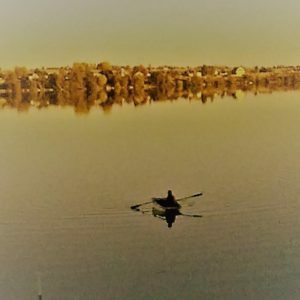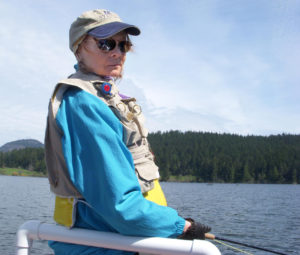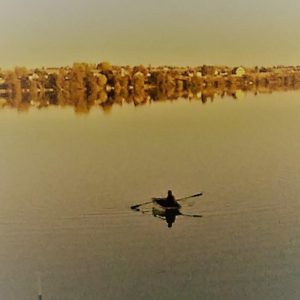 In this photo, my husband, Jimmy, rows our little “Livingston,” a micro-boat, really, just a fiberglass hull. Piloting and powering it requires two oars and minimal skill, but lots of effort.
In this photo, my husband, Jimmy, rows our little “Livingston,” a micro-boat, really, just a fiberglass hull. Piloting and powering it requires two oars and minimal skill, but lots of effort.
Learning anything is a process, often a long process. How, then, is the impulse initiated for one to embark upon such a journey? What would motivate me to take on the challenge of learning something new—to step away from the ease of familiarity and row a little boat?
I grew up on a farm in Northeastern Colorado. The nearest body of water was Jackson Lake, a reservoir; its purpose, irrigation. For me, it held no allure. Its surface was laden with dead fish and beer cans.
But on a muddy stretch of the lakeshore, my mother and I shared a wonderful adventure—with our pastor’s wife! We went fishing. The audacity of it! A farmer’s wife and a farmer’s daughter introduced to fishing by a pastor’s wife!
The year was 1961 and I was ten years old when Reverend and Mrs. Spicer moved into the parsonage of our little, wood-framed church. They were young and, in their quiet way, they were bold. For this, their first ministerial position, they had moved all the way from Oklahoma!
“That young woman will miss her home!” my mother observed. “She’ll need a friend.” As was her habit, my mother reached out, and several weeks later, we were privileged to go fishing with our pastor’s wife.
Mrs. Spicer drove her car right onto the muddy lakeshore. In the trunk was a basket holding the lunch she’d packed. Key to our expedition, she brought fishing gear and tackle for the three of us. Mrs. Spicer’s rod-rigging skills were nothing to sneeze at. On each of the three rods’ lines, she attached two hooks on short lengths of tippet branching from the end.
Soon, Mrs. Spicer saw a bend in the rod she gripped, felt a strong tug. The weight of the fish, though, and possibly the fight, caused the line to break off.
It wasn’t long before I thrilled to an insistent yannkk on my line. The tackle was equal to the job, the knots held, in spite of the fact that, as I reeled in, I snagged the line bearing the fish—two of them—that Mrs. Spicer had earlier lost.
I’d caught four fish. All at one time. They gleamed in coats of gold.
For a pastor’s wife and a farmer’s wife, jubilation. For a farmer’s daughter, a milestone.
Of course, Mrs. Spicer possessed qualities even more impressive than her fishing skills. In my mother, Jessie Ann, there was much to admire beyond her unique “take” on inner challenges. Those women were brave. They were progressive.
One evening as our family ate supper around the kitchen table, my mother commented, “Mrs. Spicer wears a hat each time she attends church. Of course, you’ve noticed.” No one responded. My mother concluded, “Well, she does.”
At future services I confirmed that, indeed, Mrs. Spicer always wore a hat in church, the only woman who did so, other than my Great-aunt Mattie. Hats, by the early ‘60s, were no longer de rigueur. Nor preferred. Hats were stored in boxes, cossetted, and, when worn, required the use of hatpins, as they were prone to blowing off one’s head in the brash, Colorado winds.
But Mrs. Spicer chose to wear a hat every Sunday. She owned her personhood. Each hat was a statement, an expression of self-possession. As was her fishing.
Those four fish I caught—beginner’s luck? I’ll take it. I had the great good luck, many years later, to meet Jimmy, who became my wonderful husband. He took me to a fly fishing presentation in Bellevue and, instantly, I was hooked. Fly fishing isn’t easy. I’m still learning. That’s part of its appeal. And fishing hats—they are so much fun!
I’ve learned to row various boats over the years—one was an industrial sewing machine, used to stitch fiber-glass-infused fabric into cushions for campers and trailers at an Idaho factory. Another was a switchboard at a tower crane company in Oregon. In Washington, mastering the espresso machine at my small bookstore was an enjoyable challenge.
 I am an educator, now retired. I am curious about absolutely everything, but, especially, the history of the Japanese American community. I stay busy with research, much reading, some travel. I ask questions about complex issues. Along the way, I’ve enjoyed many whimsical entertainments while wearing interesting hats!
I am an educator, now retired. I am curious about absolutely everything, but, especially, the history of the Japanese American community. I stay busy with research, much reading, some travel. I ask questions about complex issues. Along the way, I’ve enjoyed many whimsical entertainments while wearing interesting hats!
I hope to chat with you again in weeks to come, but now I must head to the water’s edge. I hear the call of a little boat—and a Clearwater II Tip-Flex fly rod, a 5-weight floating line, some 5X tippet, and a 2-tone midge.
Sincerely,
Shirley

Photo: Elaine Settles
*After, Richard Bode: First You Have to Row a Little Boat: Reflections on Life & Living. Grand Central Publishing, 1993
PS: It isn’t only fishing hats I love.

